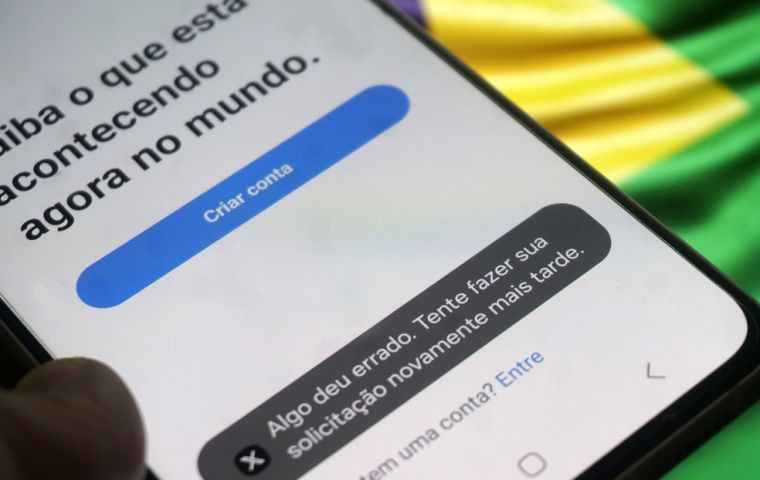MercoPress. South Atlantic News Agency
Brazil's STF in favor of holding social media accountable for users' harmful content
 The STF said no court order was necessary after an extrajudicial requirement to remove content
The STF said no court order was necessary after an extrajudicial requirement to remove content Brazil's Supreme Federal Court (STF) decided Thursday by 8 votes to 3 that social networks should be held accountable for any illegal content posted on them by their users.
After six consecutive sessions, the STF ruled that Article 19 of the Internet Civil Rights Framework (Law 12,965/2014) was unconstitutional, thus establishing the rights and duties for the use of the internet in Brazil.
The provision established that, “in order to ensure freedom of expression and prevent censorship”, platforms could only be held responsible for the posts of their users if, after a court order, they did not take steps to remove the illegal content.
Hence, before the STF decision, big tech companies were not civilly liable for illegal content, such as anti-democratic posts, messages with hate speech, and personal offenses, among others.
But the STF endorsed setting the guidelines that platforms must follow to remove these posts, since Article 19 does not protect fundamental rights and democracy. In addition, until a new law on the matter is approved, providers will be subject to civil liability for user posts.
Per the decision, platforms must remove the following types of illegal content after extrajudicial notification: Anti-democratic acts; Terrorism; Inducement of suicide and self-harm; Incitement to discrimination based on race, religion, gender identity, homophobic and transphobic behavior; Crimes against women and content that spreads hatred against women; Child pornography; and Human trafficking.
The last vote on the issue was cast Thursday by Justice Nunes Marques, who was against holding networks directly liable. He argued that direct liability should be created by Congress. In his view, freedom of expression is a constitutional clause and must be protected. Therefore, the responsibility for publishing content lies with those who caused the damage, that is, the user. “Freedom of expression is a cornerstone for the necessary exchange of ideas, which generates the development of society. That is, only through the free debate of ideas can individuals and society develop in all fields of human knowledge,” he stated.
In previous sessions, Justices Flávio Dino, Alexandre De Moraes, Gilmar Mendes, Cristiano Zanin, Luiz Fux, Dias Toffoli, Luís Roberto Barroso, and Cármen Lúcia were in favor of holding networks directly liable, while André Mendonça and Edson Fachin voted to maintain the current rules preventing networks from being held directly liable.
The STF ruled on two specific cases involving the Internet Civil Rights Framework that reached the Court through appeals.
In the case reported by Justice Dias Toffoli, the court ruled on the validity of the rule requiring a prior court order to hold providers liable for unlawful acts. The case involves an appeal by Facebook to overturn a court decision that sentenced the platform for moral damages for creating a fake user profile.
In the case reported by Justice Luiz Fux, the STF discussed whether a company that hosts a website on the internet should monitor offensive content and remove it from the air without judicial intervention. The appeal was filed by Google.
The STF's unprecedented decision is expected to change the way big tech operates in Brazil after it was ruled that, in the face of massive posts of disinformation, anti-democratic content, and hate speech, the existing norms did not protect fundamental rights and democracy.
As a result, networks should be held responsible for illegal posts if they do not take down illegal content after receiving extrajudicial notification from those involved, without the need for a prior court decision.
The main point of the decision involves the immediate removal of posts with serious criminal content. In the event of non-compliance, the platforms should be held responsible for the moral and material damage caused by users to third parties.
The STF also defined that replications of posts that have been declared illegal by the courts must be removed by all providers, regardless of new decisions.
In cases involving crimes of libel, defamation, and slander committed by one person against another, a court decision to remove the posts remains necessary, which also applies to e-mail and WhatsApp content.
The STF also confirmed that the platforms must set up a legal entity in the country and comply with the Court's orders, providing information on content moderation and other matters determined by the Court.
The Court's decision will be valid until Congress draws up a law to deal with liability. “Until such time as new legislation is enacted, art. 19 of the MCI must be interpreted in such a way that internet application providers are subject to civil liability, except for the application of the specific provisions of electoral legislation and the normative acts issued by the TSE,” the STF ruled.
The Court's decision must be complied with by the platforms from now on and will not be applied retroactively. (Source: Agencia Brasil)




Top Comments
Disclaimer & comment rulesCommenting for this story is now closed.
If you have a Facebook account, become a fan and comment on our Facebook Page!